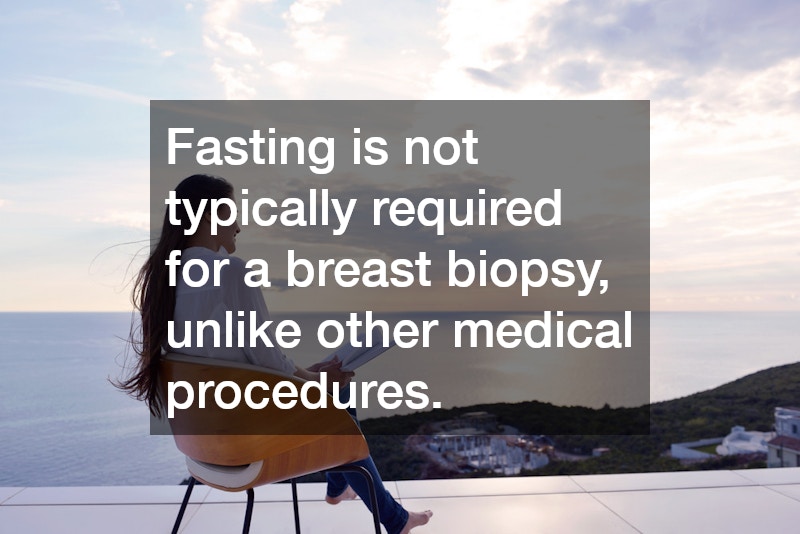
Disclaimer: This website provides health information for educational purposes only and is not a substitute for professional medical advice, diagnosis, or treatment. Always seek the guidance of a qualified healthcare provider with any questions you may have.
Undergoing a breast cancer biopsy can be a daunting prospect. It is a critical step in the diagnostic process that helps determine the presence of cancerous cells. Understanding what to expect can alleviate some of the anxiety surrounding the procedure.
Preparation for the Biopsy
Before undergoing a breast cancer biopsy, your healthcare provider will walk you through the process. The preparation phase is crucial to ensure the procedure goes smoothly.
It is important to discuss any medications you are taking, as certain drugs might need to be paused before the biopsy.
Fasting is not typically required for a breast biopsy, unlike other medical procedures. However, comfort is key, so it’s advisable to wear a two-piece outfit for ease of access during the biopsy. Additionally, arranging transportation to and from the medical facility can be beneficial, as some patients prefer not to drive afterward.
Understanding the type of biopsy your doctor recommends can also help you prepare mentally. Different techniques, such as fine needle aspiration, core needle biopsy, or excisional biopsy, each have slightly different preparation and procedural expectations. Clarifying these details with your doctor helps set realistic expectations for the day of the procedure.
The Biopsy Procedure
The biopsy procedure itself generally takes about 30 to 60 minutes. Local anesthesia is commonly used, meaning you will be awake but should not feel intense pain during the procedure. You’ll be positioned comfortably, and the area will be cleaned before the doctor starts.
During the biopsy, your doctor will use imaging techniques like ultrasound or mammography to guide the needle to the exact area of concern. This precision helps in obtaining an accurate sample for analysis. The process might cause some pressure or mild discomfort, but should not be painful.
Once the sample is collected, it is sent to a laboratory for examination under a microscope. The pathologist will analyze the cells or tissues to determine the presence and characteristics of any abnormal growths. This analysis is key to crafting an accurate diagnosis and subsequent treatment plan.
Waiting for Results
After the procedure, one of the most challenging aspects for patients is waiting for results. Many wonder, ” If I have cancer will my biopsy results come back fast?” Typically, results are available within a few days to a week, allowing the pathologist adequate time to conduct a thorough analysis.
This waiting period can be a source of significant anxiety. However, it’s important to remember that the time taken to deliver results directly correlates with accuracy and reliability. The laboratory ensures that every finding is carefully assessed before making any conclusions.
During this time, keeping in touch with your healthcare provider can provide reassurance. They can offer insights into what the results might imply and guide you on potential next steps. Maintaining open communication is essential in navigating this period of uncertainty.
Understanding the Results
Once you receive your biopsy results, your doctor will explain what they mean in detail. A positive result indicates the presence of cancerous cells, while a negative result suggests no evidence of cancer. The results can also provide information on the type and grade of cancer if present, which are crucial for treatment planning.
If the results indicate cancer, you and your doctor will discuss the most appropriate treatment options. These may include surgery, radiation, chemotherapy, or other targeted therapies. Understanding your diagnosis allows for informed decision-making and empowerment in managing your health.
Even in the case of a negative result, it’s vital to continue with regular screenings as advised by your healthcare provider. Consistent monitoring helps in early detection if changes occur over time. Awareness and proactive management are keys to maintaining health and peace of mind.
Emotional and Psychological Support
The emotional impact of undergoing a biopsy and awaiting results can be significant. Support from family, friends, or support groups can be invaluable during this time. Engaging with communities who share similar experiences can provide comfort and understanding.
Consider discussing your feelings with a counselor or therapist specializing in medical anxiety and stress. They can provide coping strategies to handle the emotional rollercoaster that often accompanies medical procedures. Remember, seeking help is a strength, not a weakness.
Self-care practices, such as meditation, exercise, and mindfulness, can also help manage stress and anxiety. Maintaining a balanced lifestyle can enhance emotional resilience, making it easier to face the challenges that come with a biopsy and its aftermath. Prioritizing mental wellness is as important as attending to physical health.
.
